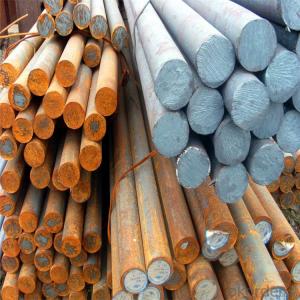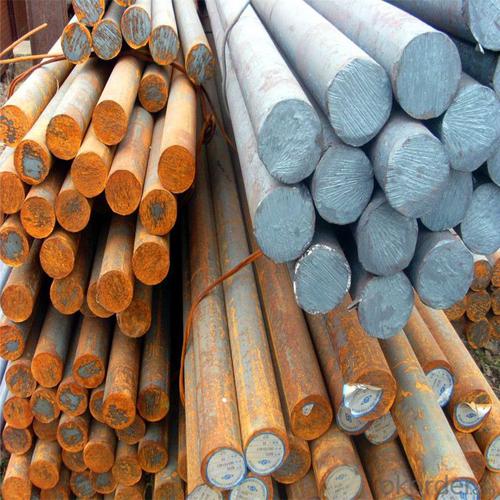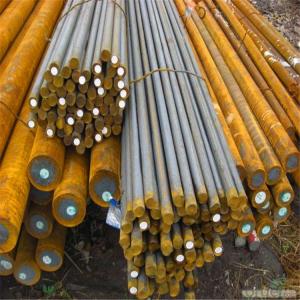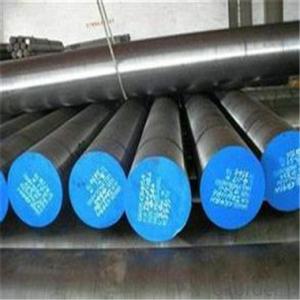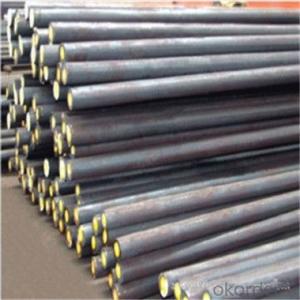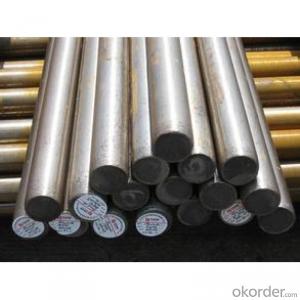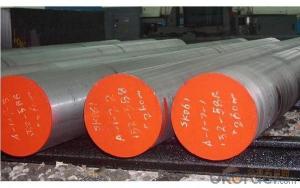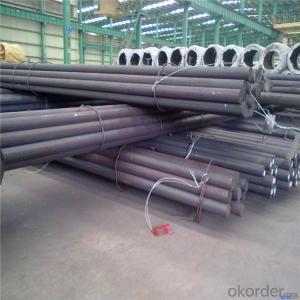Alloy Tool Steel Round Steel Bar S20c
- Loading Port:
- Tianjin
- Payment Terms:
- TT OR LC
- Min Order Qty:
- 100 m.t.
- Supply Capability:
- 500000 m.t./month
OKorder Service Pledge
OKorder Financial Service
You Might Also Like
Specification
Alloy Tool Steel Round Steel Bar S20c
Product Description of Alloy Tool Steel Round Steel Bar S20c
1. Steel grade: SAE1020, 20#, C22, S20C
2. Length: 6M-12M
3. Diameter: 16mm-300mm
4. Product range: round bar, flat bar, square bar
5. Technique: Hot rolled, forged, cold drawn
Specification of Alloy Tool Steel Round Steel Bar S20c
Material | S20C | Round bar | Dia(mm) | 16-300mm |
Process | EAF + LF + VD + Forged + Heat Treatment (optional) | Length (mm) | Max 12m | |
Heat treatment | Normalized / Annealed / Quenched / tempered | Flat bar | Thickness(mm) | 8-500mm |
Delivery condition | Hot forged +Rough machined (black surface after Q/T)+ Turned (optional) | Width(mm) | 70-200mm | |
Test | Ultrasonic test according to SEP 1921-84 D/d | Length (mm) | Max 12m |
Chemical Composition of Alloy Tool Steel Round Steel Bar S20c
C | Si | Mn | Cr | Ni | Cu |
0.17~0.23 | 0.17~0.37 | 0.35~0.65 | ≤0.25 | ≤0.30 | ≤0.25 |
Photo Show of Alloy Tool Steel Round Steel Bar S20c
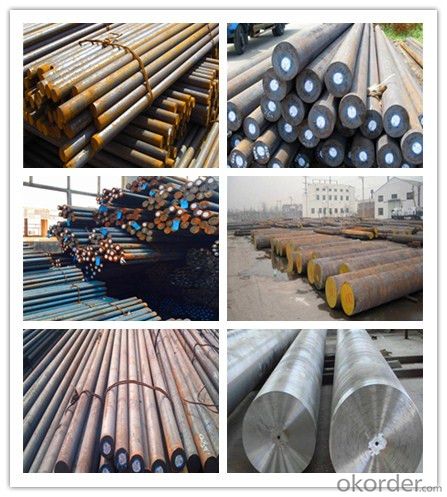
Packing and Delivery:
Packing in bundle package, or as customer's requirements.
Delivery Detail: 45 days after receiving the deposit.
Usage and Applications of Alloy Tool Steel Round Steel Bar S20c
1. Steel round bar is used in a large number of architectural and engineering structures. Or it can be used in construction of plants for the production of steel house frames, high-voltage transmission towers, bridges, vehicles, boilers, containers, ships, etc.
2. And we can use this kind of product on the performance of the mechanical parts if the demand is not very high.
3. Some special material steel round bar can be used for main shaft of steamer, hummer shank, with big section and supper force.
Company Information
CNBM International Corporation is the most important trading platform of CNBM group.
Whith its advantages, CNBM International are mainly concentrate on Cement, Glass, Iron and Steel, Ceramics industries and devotes herself for supplying high qulity series of refractories as well as technical consultancies and logistics solutions.


F A Q
1, Your advantages?
professional products inquiry, products knowledge train (for agents), smooth goods delivery, excellent customer solution proposale
2, Test & Certificate?
SGS test is available, customer inspection before shipping is welcome, third party inspection is no problem
3, Factory or Trading Company?
CNBM is a trading company but we have so many protocol factories and CNBM works as a trading department of these factories. Also CNBM is the holding company of many factories.
4, Payment Terms?
30% TT as deposit and 70% before delivery.
Irrevocable L/C at sight.
5, Trading Terms?
EXW, FOB, CIF, FFR, CNF
6, After-sale Service?
CNBM provides the services and support you need for every step of our cooperation. We're the business partner you can trust.
For any problem, please kindly contact us at any your convenient time.
We'll reply you in our first priority within 24 hours.
- Q: What are the advantages of using nickel-manganese alloy steel round bars?
- Nickel-manganese alloy steel round bars provide numerous benefits in various applications. To begin with, these round bars exhibit exceptional strength and toughness. The incorporation of nickel and manganese significantly enhances the overall strength and durability of the steel, rendering it suitable for heavy-duty applications that demand high strength and resistance to wear and tear. As a result, industries such as construction, automotive, and manufacturing find these alloy steel round bars highly advantageous. Additionally, nickel-manganese alloy steel round bars possess outstanding corrosion resistance properties. The nickel content in the alloy imparts remarkable resistance to corrosion, making it ideal for use in harsh environments or situations where exposure to corrosive substances is common. Consequently, the lifespan of these round bars is extended, reducing the need for frequent maintenance or replacement. Moreover, these round bars demonstrate excellent heat resistance. They can withstand elevated temperatures without compromising their structural integrity, making them suitable for applications involving extreme heat or thermal cycles. Industries like aerospace, power generation, and oil and gas greatly benefit from this heat resistance property. Furthermore, nickel-manganese alloy steel round bars offer favorable weldability and machinability. The composition of the alloy facilitates easy welding and machining, allowing manufacturers to fabricate components or structures with ease. This versatility in processing makes the round bars highly adaptable to varying manufacturing processes and requirements. Moreover, these round bars exhibit good ductility and formability. The alloy's composition permits easy shaping or forming into various configurations without sacrificing its structural integrity. Consequently, they are suitable for applications that necessitate complex shapes or intricate designs. In conclusion, the advantages of utilizing nickel-manganese alloy steel round bars encompass exceptional strength, corrosion resistance, heat resistance, weldability, machinability, and formability. These properties make these round bars a dependable and versatile choice for a broad range of applications across different industries.
- Q: Can steel round bars be used in the agricultural industry?
- Indeed, the agricultural industry can utilize steel round bars. Within this sector, there exists a broad array of applications for them, including the construction of fences, gates, and livestock enclosures. Moreover, steel round bars are frequently employed as support and reinforcement in structures like barns, sheds, and agricultural machinery. Due to their exceptional strength and durability, they are well-suited for enduring the challenging conditions and heavy loads often encountered in agricultural environments. Furthermore, steel round bars can undergo further processing and fabrication, resulting in an assortment of agricultural tools and equipment, such as hitches, plows, and cultivators. In summary, steel round bars represent a versatile and dependable material capable of effectively satisfying the agricultural industry's requirements.
- Q: What are the different heat treatment processes for steel round bars?
- Enhancing the mechanical properties and improving the overall performance of steel round bars can be achieved through various heat treatment processes. Here are a few examples: 1. Annealing: By subjecting the steel round bars to high temperatures followed by slow cooling, typically in a furnace, internal stresses are relieved, ductility is improved, and the grain structure of the steel is refined. 2. Normalizing: This process involves heating the steel round bars to a temperature above the critical range and then allowing them to cool naturally. It helps refine the grain structure, enhance machinability, and improve the mechanical properties of the steel. 3. Quenching and tempering: Rapid cooling, or quenching, is done by immersing the heated steel round bars in a quenching medium like oil or water. This produces a hard and brittle structure known as martensite. To reduce brittleness and improve toughness, tempering involves reheating the quenched steel to a specific temperature and cooling it. This process enhances the strength, hardness, and toughness of the steel. 4. Stress-relieving: By heating the steel round bars to a specific temperature below the critical range and maintaining it for a set period, stress-relieving helps reduce residual stresses that may have developed during previous manufacturing processes. This improves dimensional stability and reduces the risk of distortion or cracking. 5. Induction hardening: This specialized heat treatment process selectively heats the surface of the steel round bars using high-frequency induction currents. By quickly raising the surface temperature, it allows for hardening through subsequent quenching. Induction hardening is commonly used to increase surface wear resistance and hardness while preserving the core's toughness and ductility. These represent some of the commonly employed heat treatment processes for steel round bars. The choice of the appropriate process depends on the desired mechanical properties, intended application, and specific requirements of the steel round bars.
- Q: Can steel round bars be used in the manufacturing of appliances?
- Yes, steel round bars can be used in the manufacturing of appliances. Steel is a durable and versatile material that can be shaped into different forms, including round bars, which can be used for various purposes in appliance manufacturing such as structural support, handles, or components.
- Q: What are the different types of steel round bars available in the market?
- There are several different types of steel round bars available in the market, including mild steel round bars, carbon steel round bars, alloy steel round bars, stainless steel round bars, and tool steel round bars. Each type of steel round bar has its own specific properties and applications, making them suitable for various industries and purposes.
- Q: What are the different cutting methods for steel round bars?
- There are several cutting methods for steel round bars, including sawing, shearing, flame cutting, and abrasive cutting.
- Q: What are the advantages of using nickel-lead alloy steel round bars?
- There are several advantages of using nickel-lead alloy steel round bars: 1. Enhanced corrosion resistance: Nickel-lead alloy steel round bars exhibit excellent corrosion resistance, making them suitable for use in various industries, especially those dealing with harsh environments or corrosive substances. This property ensures the longevity and durability of the bars, reducing the need for frequent replacements. 2. Superior strength and toughness: The inclusion of nickel and lead in the alloy composition enhances the strength and toughness of the steel round bars. This makes them highly resistant to deformation, cracking, and wear, even under high-stress conditions. As a result, these bars can withstand heavy loads and impacts, making them ideal for applications that require robust and reliable materials. 3. Improved machinability: Nickel-lead alloy steel round bars possess excellent machinability, allowing for easy cutting, drilling, and shaping during fabrication processes. The alloy's composition enables efficient chip evacuation and reduces tool wear, resulting in increased productivity and cost-effectiveness in manufacturing operations. 4. Thermal stability: Nickel-lead alloy steel round bars exhibit excellent thermal stability, making them suitable for applications that involve high temperatures or extreme thermal cycling. These bars can withstand thermal expansion and contraction without experiencing significant dimensional changes, ensuring dimensional accuracy and structural integrity over time. 5. Low coefficient of friction: The addition of lead to the alloy composition contributes to a low coefficient of friction, reducing friction and wear between the bars and other surfaces. This property is particularly valuable in applications where minimal wear and lubrication are essential, such as in bearings or sliding components. 6. Electrical conductivity: Nickel-lead alloy steel round bars possess good electrical conductivity, making them suitable for applications that require efficient electrical current flow. This property is beneficial in electrical connectors, circuit breakers, and other electrical components, where reliable conductivity is crucial. In summary, the advantages of using nickel-lead alloy steel round bars include enhanced corrosion resistance, superior strength, improved machinability, thermal stability, low friction coefficient, and good electrical conductivity. These properties make them an excellent choice for a wide range of applications in various industries.
- Q: How can steel round bars be protected against corrosion?
- Steel round bars can be protected against corrosion through various methods. One common method is the application of a protective coating such as paint or epoxy. The coating acts as a barrier between the steel surface and the corrosive elements in the environment, preventing direct contact and thus reducing the risk of corrosion. Another effective way to protect steel round bars from corrosion is by galvanizing them. Galvanization involves coating the steel with a layer of zinc, which acts as a sacrificial anode. The zinc layer corrodes instead of the steel, providing a long-term protection against corrosion. Regular maintenance and inspection are also important in preventing corrosion. This includes removing any rust or scale that may have formed on the surface of the steel round bars, as these can accelerate the corrosion process. Additionally, keeping the steel round bars dry and free from moisture is essential, as excessive exposure to water or humidity can lead to corrosion. In industrial environments or areas where corrosive chemicals are present, it may be necessary to use specialized corrosion-resistant alloys for the steel round bars. These alloys, such as stainless steel or nickel alloys, have a higher resistance to corrosion and can withstand harsh conditions better than regular steel. Overall, the key to protecting steel round bars against corrosion is a combination of proper coatings, regular maintenance, and selecting the appropriate materials for the specific environment in which they will be used.
- Q: How are steel round bars used in the manufacturing of agricultural machinery?
- Steel round bars are commonly used in the manufacturing of agricultural machinery as they provide strength, durability, and flexibility. These bars are often used to construct various components such as axles, shafts, and pins, which play a crucial role in supporting and transmitting power within the machinery. The high tensile strength of steel round bars allows them to handle heavy loads and withstand harsh operating conditions, ensuring the reliability and longevity of the agricultural equipment.
- Q: What is the difference between a rough turned and a precision ground steel round bar?
- A rough turned steel round bar is a raw material that has undergone minimal machining, leaving a slightly rough surface finish. It is typically used for applications where a high level of precision is not required, such as structural components. On the other hand, a precision ground steel round bar is a finished product that has undergone precise machining to achieve a smooth and accurate surface finish. This process ensures tight dimensional tolerances and a consistent diameter throughout the length of the bar. Precision ground bars are commonly used in applications that require close dimensional control and a high level of accuracy, such as in machinery and tooling.
Send your message to us
Alloy Tool Steel Round Steel Bar S20c
- Loading Port:
- Tianjin
- Payment Terms:
- TT OR LC
- Min Order Qty:
- 100 m.t.
- Supply Capability:
- 500000 m.t./month
OKorder Service Pledge
OKorder Financial Service
Similar products
Hot products
Hot Searches
Related keywords
